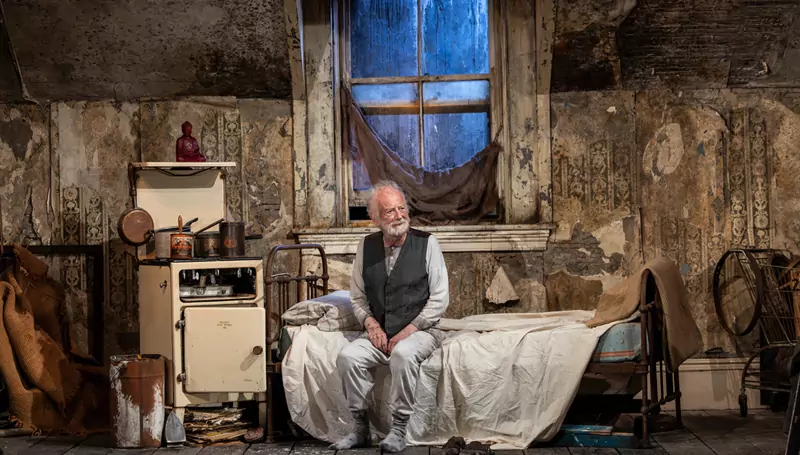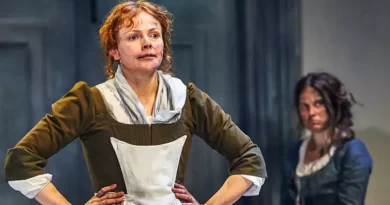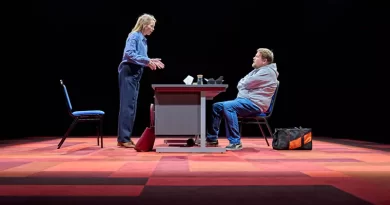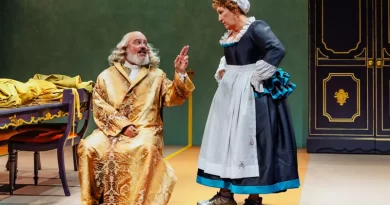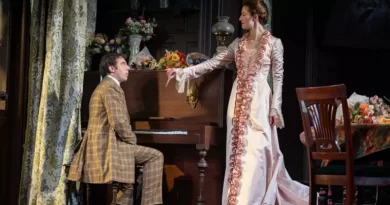“The Caretaker”, Chichester Festival Theatre, Minerva
Jeremy Malies in West Sussex
17 June 2024
“You’ve got a lot of stuff here!” says Ian McDiarmid playing Davies, the caretaker of the title, who is given a berth in the shabby cluttered house off the Goldhawk Road in Shepherd’s Bush. It must be a welcome line for any set designer, and Stephen Brimson Lewis rises to the challenge (while retaining discipline) with the Minerva even featuring an additional leak-ridden ceiling to show the decrepit and fragile nature of the property.
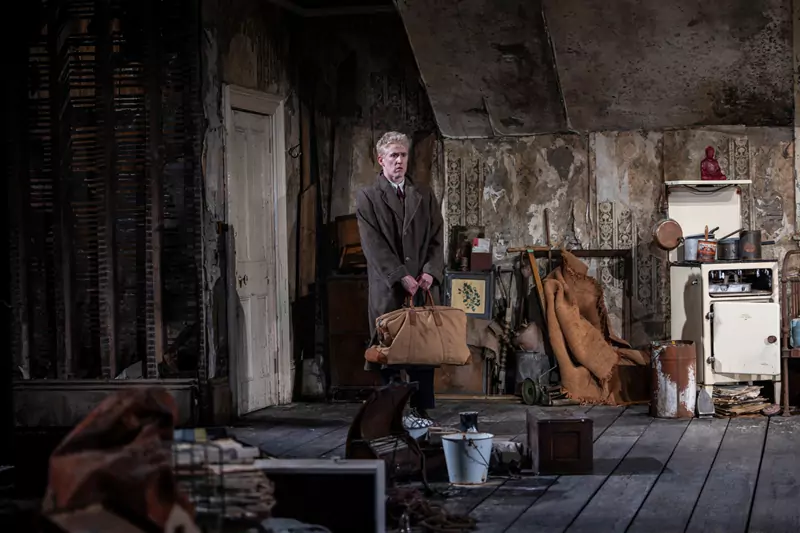
Adam Gillen as Aston.
Photo credit: Ellie Kurttz.
Amid the ballyhoo that surrounded Harold Pinter’s Nobel laureateship, a perceptive citation stressed how the plays underline “the hide-and-seek of interlocution”. It’s an aspect of the writing that is treated well by Justin Audibert who, in his opening season as artistic director, takes the helm on a production for the first time.
Adam Gillen is Aston, the former – possibly lobotomized – mental patient while Jack Riddiford plays Mick, the more dominant would-be builder who enjoys peekaboo with the other two men. As the trio fight over a bag of mouldy clothing, we see Audibert excel as he develops what is obviously a struggle over territory into push-and-shove over possessions.
But elsewhere, the physical work is less inspired. I should like to be more aware that Davies has just been rescued from a fight; he should be still ducking and even throwing punches. And while the text should not be played solely for laughs, I felt McDiarmid could have extracted more from the comedy in his succession of unsuitable shoes both here and in distant Luton where even a mother superior has sworn at him! And I looked for a more predatory brooding aspect to Riddiford with his own crazed signature speech that stretches from long jump techniques to a dramatized bus timetable for Highbury and Islington.
Is all this truly Pinteresque? Well, that’s a lazy adjective anyway for a playwright who was never prescriptive. Audibert does not resort to mannered pauses though he ensures the actors give the dialogue room to breathe. And McDiarmid conveys Davies’s general ignorance skilfully. Asked by Mick if he has served in the colonies, he says: “I was one of the first over there!”
But the tramp has rat-like cunning and speed of thought when deciding how to play the brothers against each other, and his taunting of Aston after the secure mental hospital monologue (complete with gestures showing electric pincers) is still with me as I type. Gillen has been static during this, knowing that the innate modulation in the lines will do the heavy lifting for him. Initially thinking he might be too young for the role, I was struck when Gillen mentions that as a minor, he was betrayed by the fact that parental consent was given for a course of electroconvulsive therapy.
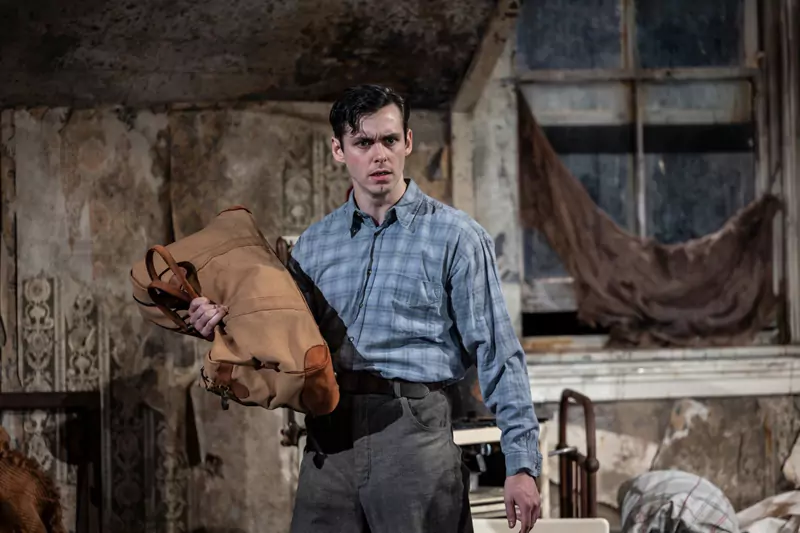
Jack Riddiford as Mick.
Photo credit: Ellie Kurttz.
Back to the set. It’s extraordinarily detailed and also enveloping. An inner door shows us the grotty nature of the landing from which Mick does a lot of eavesdropping. Simon Spence’s lighting from the single window hints at street lamps and the rain that (conveniently perhaps) stops Davies from asserting himself by collecting the famed papers stored in Sidcup.
Composer Jonathan Girling inserts minimalistic cello music during the partial blackouts between the acts, with the characters adopting mime-like postures. I take this as Audibert balancing absurdism with the realism that centres on an unflinching portrayal of Fifties racism. Just occasionally, McDiarmid is short of gesture (there is a little too much chest and thigh-thumping) and for a while he veers dangerously into Wilfrid Brambell and Max Miller mannerisms. But the shiftiness over his dual identity and posturing in a donated smoking jacket are closely observed.
In old age Pinter often complained that his plays are far funnier than over-reverent productions tend to make them. Audibert treads through the hinterland that divides comedy from psychological breakdown. He is alive to the cat and mouse quality of the play’s structure and the abundance of good jokes. I left chuckling at Davies’s account of marital breakdown which turned solely on him discovering a cooking pan full of his wife’s dirty underwear – and the vegetable pan at that! Without derailing the flow of the play, McDiarmid rode a gale of laughter here. The confirmed bachelor in me thought that if the result is that he is now left in a Beckettian limbo of a ceaseless quest to get south of the river in ill-fitting shoes then perhaps it’s not such a bad exchange.

